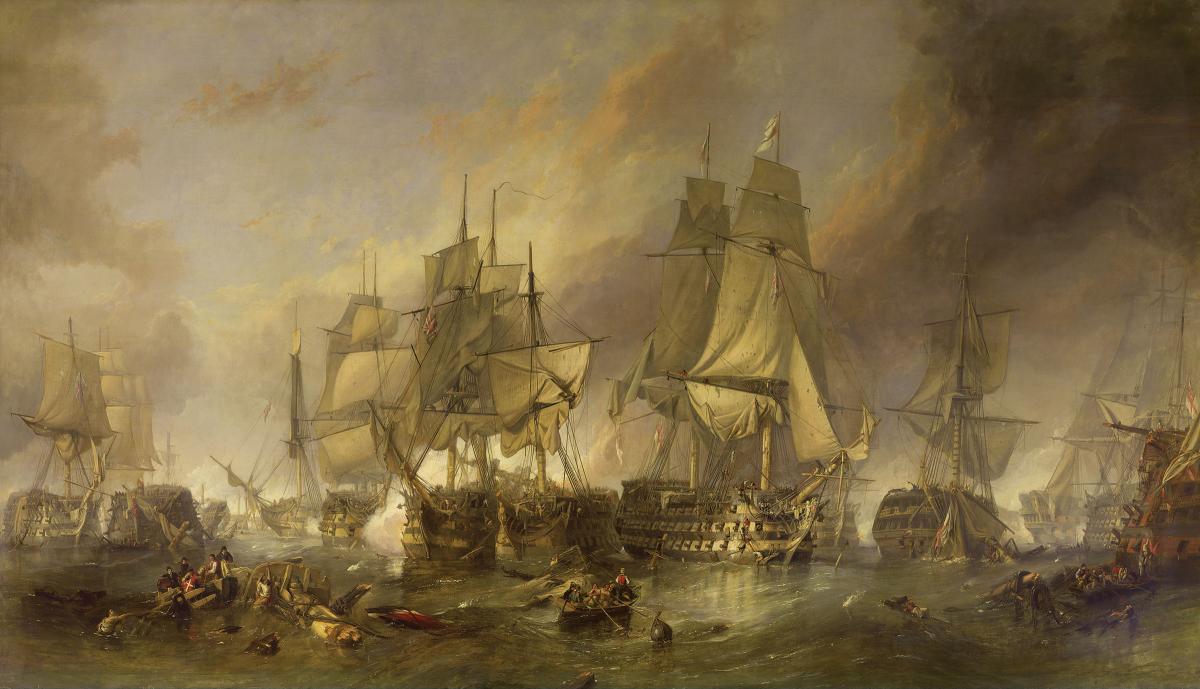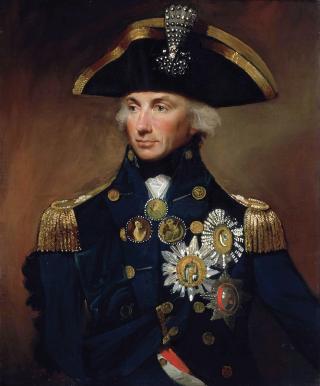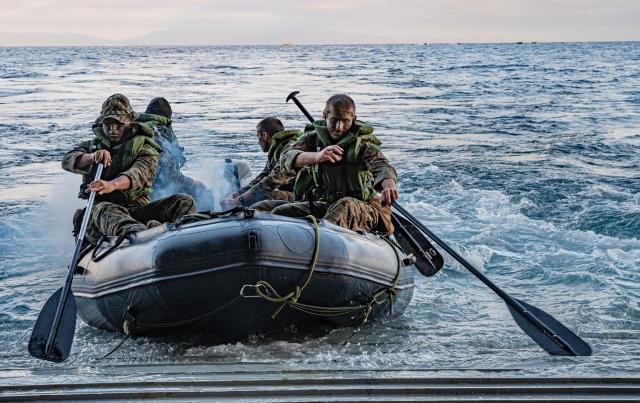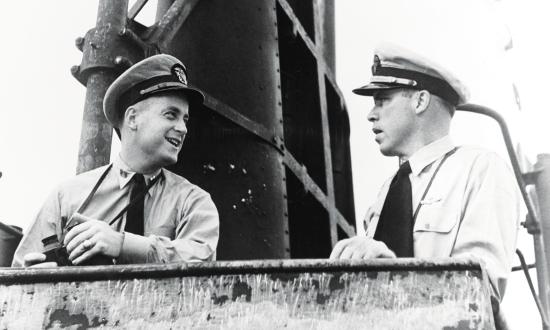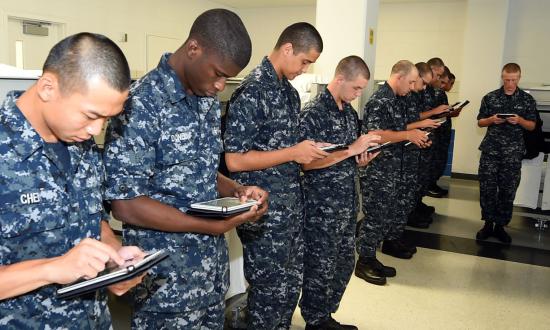Decentralized control—necessitated by the lack of communications technology and the global theater—was fundamental to naval operations during the Age of Sail. Success was enabled by an organizational culture predicated on a high degree of initiative, a keen sense of honor, trust between seniors and subordinates, and clear communication of commander’s intent. All of these cultural characteristics are needed today and are of increasing importance in an era of contested communications and great power competition. With recent policy changes in the Marine Corps specifically oriented toward the employment of expeditionary advanced base operations, one can see increased parallels between historical sailing ships and current isolated expeditionary bases.
The decentralized organizational culture during the Age of Sail did not exist in a vacuum—it was heavily influenced by the wider society at the time. Today, the Navy and Marine Corps’ organizational culture is subject to different cultural forces, and the effects will be felt more and more as a technologically savvy generation holds more senior leadership positions. Naval leaders increasingly create systems that centralize information intake and demand more data than ever before. The expectation that commanders to instantly reach their subordinates can become an impediment to decentralized command and control. Creating a culture that can tolerate careful risk-taking coupled with a deep-seated sense of initiative, honor, and a clearly communicated mission and commander’s intent—will carry the Marine Corps to success in future armed conflicts.
Preserve Initiative
When captains sailed from port, apart from a fleet formation, they did so with orders that outlined objectives and missions assigned by an admiralty. It was then left to individual commanders to choose which opportunities to exploit while acting in accordance with assigned missions. The risk was the commander’s to accept or avoid. He could not absolve himself or transfer that risk by immediate communication or authorization from higher headquarters.
But nor could the admiralty demand constant situation reports and impose excessive information requirements. This decision space allowed commanders to exercise judgment and initiative as independent subordinate commanders, reporting their actions when they had the opportunity through mailed dispatches from friendly ports. In today’s contested spectrum environment, the Sea Services cannot expect communications capability to be available for conference with higher headquarters every time they need it. Information-hungry headquarters elements often demand large amounts of information immediately, but the future will require them to operate without the quantity of data they are used to.
This is not an indictment of information technology, but rather an argument for its intelligent use. Leaders need to understand what tools to use and when, developing information channels and formats that serve to inform decision-makers without crippling subordinate initiative. It is imperative that the Marine Corps prepare future leaders to make decisions out of range of communication.
Forming a truly decentralized control structure relies on an organizational culture that rewards initiative and calculated risk-taking, not the complete avoidance of risk. Vice Admiral Horatio Lord Nelson, in a speech to the House of Lords following his illustrious career, commented on risk aversion: “If I had been censured every time I have run my ship, or fleets under my command, into great danger, I should have long ago been out of the Service and never in the House of Peers.” Subordinate initiative in any form, so long as it is exercised with good intentions, should never be derided.
Enter an era of unprecedented, lightning-fast communication services. Now in each hip pocket sits the capability to instantly reach out to every subordinate for a report or direct control. Knowing when to let the phone keep ringing and fight the battle at hand will be one of the hardest challenges a sailor or Marine will face in the information age. Commanders who can exercise tactical patience and allow subordinates to report progress and decisions once they have been made, rather than demanding constant feedback and approval, will be the difference in coming conflicts when communication is not always available.
Allowing subordinate units to engage the enemy, act to accomplish the mission, take calculated risks, and exercise initiative to exploit opportunities ultimately will allow U.S. forces to move faster than the adversary. This requires flexibility and tolerance for less-than-perfect solutions. When subordinates make timely decisions that accomplish the mission, they should be afforded the opportunity to learn from mistakes after the fact, especially when the mistakes were caused by information that existed beyond their scope of understanding in the moment.
Nurture Honor
Organizational culture during the Age of Sail was influenced by a societal sense of honor backed by challenges and duels, and it meant one never ran from an even or lesser match. If the captain of a 74-gun frigate were to turn from a smaller or equally rated vessel, he risked not only his personal honor, but also the honor of his ship’s officers and crew. An even match gave commanders and crews the opportunity to prove their mettle and display superior fighting spirit, even at the risk of a loss. A victory scraped from an outmatched fight was something to be lauded, but a defeat in one was understandable, even if flight would have been a safer option.
This shared concept of honor, imported from civil society, helped facilitate decentralized operations because commanders knew they were expected to act in a certain manner, in accordance with their personal honor. In addition, the admiralty knew that each commander valued his honor and would endeavor to be forthright and honest in his reporting, so that no one could doubt the veracity of his statements or the intentions of his actions.
In decentralized naval operations, trust was and continues to be of paramount importance. If the admiralty could not trust the commander (today we might call it “special trust and confidence”) to execute his duties, he could not be trusted to command a vessel and captain it in the manner expected of leaders in that force. During the past decade, the pages of publications such as Military Times have been filled with stories of the relief of commanders, most often as the result of a loss of that special trust and confidence. How can we get to the root cause of all these command reliefs? Where does the system go wrong? So often it seems these commanders lose sight of the trust they are given, caving to situational pressures or climbing the peaks of confidence without the requisite competence to match. Some become so confident in their rightness and experience they cannot see the effects they have on their personnel or on the force.
This sense of personal and collective honor has become a discarded relic. This makes it imperative that the Sea Services continue to cultivate a sense of personal honor in their warriors from the first day they join the organization. Ethics case studies and modeling honorable behavior are the surest ways to indoctrinate new service members in the modes of action and honorable behavior they are expected to uphold. This is difficult to inculcate in a society that values individual freedom and competition over the collective good. Officer and enlisted professional education requirements should continually reinforce personal honor and ethical behavior. The Navy and Marine Corps should adopt an honor concept or code that outlines the expectations of honor, beyond the initial introduction to the concept in boot camp or officer candidate training. This initial indoctrination and education must be just one portion of a two-pronged effort.
The second effort is the continued relief or separation of Marines and sailors who demonstrate that they lack this standard of honorable conduct. When an individual demonstrates a pattern of behavior that is not in keeping with the institutional definition of honor, he or she must be held accountable, regardless of rank or position. There can be no room for such individuals to be given authority and responsibility without remediation. Even if it is a relatively minor offense that only requires repeating professional education requirements covering honorable and ethical behavior, remediation is an important part of this effort. All individuals exhibit lapses in judgment or maturity and must be given the opportunity to grow and develop from those experiences.
Communicate Commander’s Intent
“No captain can do very wrong if he places his ship alongside that of an enemy.” Admiral Nelson, on the eve of Trafalgar, communicated this simple commander’s intent to his captains. Though brief, it outlines a basis for action and implicit trust to his subordinates. There was a plan, but he wanted his captains to understand that beyond first contact, when the plan was lost in the thunder of the first fusillade, there was a simple, essential task for them to accomplish. So long as each one undertook efforts to further Nelson’s intent and defeat the enemy, there would be no reprimand or recrimination. Similarly, John Paul Jones was assigned a significant yet vague mission by Congress: “Distress the Enemies of the United States, by sea or otherwise, consistent with the laws of war, and the terms of your commission.”
Every officer learns to craft intent early, and continues to hone that skill over the course of his or her career. Employing sufficiently vague yet meaningful intent is more an art than a science. This must build on a commander’s understanding of his subordinates, the situation, and the enemy for it to be successful. A clear end state and intent that do not stifle freedom of action are essential for subordinate leaders to execute their assignments with clarity of purpose.
Honor and initiative are essential accompaniments to commander’s intent. A shared sense of honor ensures that commanders and subordinates can trust one another, and that each is acting according to their best judgment and the information available. High degrees of subordinate initiative and a leader’s tactical patience means commander’s intent can be as simple as Admiral Nelson’s guidance to his commanders and still achieve the desired result. Striking this delicate balance must be the goal of every leader. Crafting intent and end states that are simple, clear, and well communicated will be essential to fighting in a communication-contested environment.
This is an exciting time in the Navy and Marine Corps. Capabilities and missions are changing, new technology is being introduced, and the force is being retooled for a specific purpose. This is the time to make institutional and cultural changes to ensure success. The service must discard once and for all the zero-defect mentality, encourage tactical patience, enable and reward initiative, and cultivate a keen sense of personal honor in leaders. Leaders must allow their subordinates to make mistakes and help them learn from them. Everything cannot be “no fail.” The Marine Corps must prepare its teams for a time when air superiority is contested, the electromagnetic spectrum is used against them, and leaders and subordinates are not a phone call or email away.
The Navy and Marine Corps should be wary of the centralization effect of high-capacity, high-speed communication technology that reduces trust and initiative. The future demands that we let the phones keep ringing and sail on. Expeditionary advanced base operations will require this, whether the Marine Corps and Navy adapt to it now or on first contact. When the satellites go down, the weather is bad, and opportunity is fleeting, that is when Marines and sailors will be most tested. Operating inside the weapon engagement zone will require long periods of radio silence and leaders making the best decisions with limited information.
By taking a few lessons in organizational culture from the Age of Sail, the Sea Services can deal with uncertainty and risk without being frozen by indecision and doubt.



